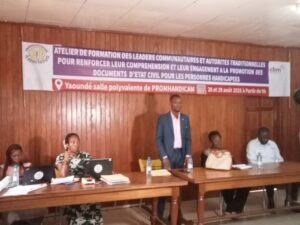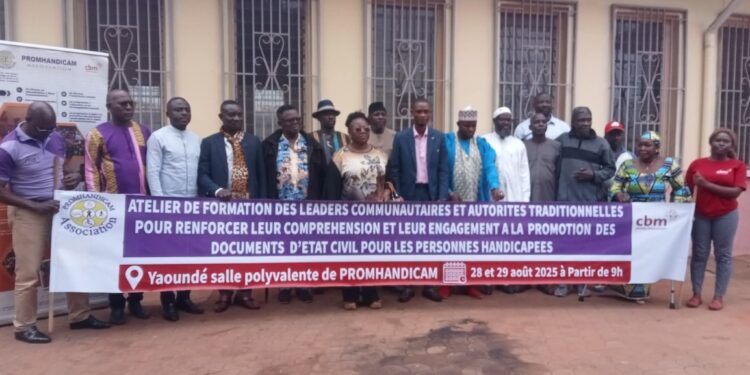 Story, Louvier Kindo Tombe
Story, Louvier Kindo Tombe
For many persons living with disabilities, something as basic as a birth certificate or a national identity card remains out of reach.
Without these documents, they are invisible in the eyes of society—unable to access school, health care, or even the most fundamental social services.
It is this silent struggle that Promhandicam, a Yaoundé-based association dedicated to the promotion and reintegration of persons with disabilities, has decided to tackle head-on.
On August 28, 2025, the organization convened community leaders and traditional authorities at its Mimboman headquarters for a training workshop on the importance of civil status documents for persons with disabilities.
The initiative marks the beginning of a nine-month pilot program in the Yaoundé.
During this phase, 70 people with disabilities—30 children and 40 adults—will finally obtain the documents that legally recognize them as citizens: birth certificates, national identity cards, and national invalidity cards.
“We cannot implement the project alone; that is why we chose to begin with community leaders and traditional authorities,” explained Paul Bernard Noah, General Manager of Promhandicam-Association.
These leaders will act as vital bridges between the disabled, their families, and administrative offices, helping to navigate and fast-track the often daunting paperwork.
The workshop was presided over by the Divisional Delegate of Social Affairs for Mfoundi, who highlighted the stakes of the project.
“You cannot benefit from society’s services—such as education or health care—when you lack the basic civil status documents,” she said as she officially launched the training.
She praised Promhandicam’s choice to involve community leaders, stressing that their proximity to families makes them key allies in ensuring that no disabled person remains undocumented.
Beyond statistics and paperwork, however, this initiative represents hope. For the 12-year-old child who has never been able to sit for an exam because she has no birth certificate, for the young man in a wheelchair denied medical insurance for lack of an ID, and for the elderly woman unable to claim her pension—this project is more than documentation. It is a doorway to recognition, dignity, and opportunity.
By championing identity rights, Promhandicam is not merely producing papers. It is affirming that persons with disabilities have a rightful place in society—and giving them the keys to fully belong.
This groundbreaking program comes at a symbolic moment: Promhandicam is marking its 50th anniversary this year.
For half a century, the association has been a pioneer in defending the rights of persons with disabilities in Cameroon. From education and health to legal identity and social inclusion, its golden jubilee celebrations remind the public that the fight for equality is far from over—and that Promhandicam remains as committed today as it was in 1975.








